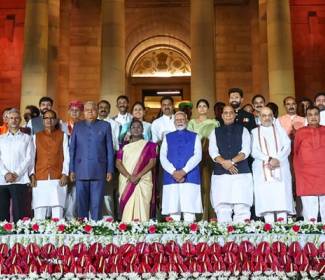India is set to embark on an ambitious journey of becoming a global leader in the semiconductor industry, with a projected domestic semiconductor consumption expected to cross $ 80 billion by 2026. At the heart of India's push for semiconductor self-reliance lies a vision to reduce dependence on imports and establish domestic manufacturing capabilities. Policymakers and politicians, including Prime Minister Narendra Modi, have emphasised the sector's importance to India's future and aim to establish the country as a key partner in the global semiconductor supply chains. This vision is propelled by several advantages that India possesses, making it a promising destination for semiconductor innovation and production.
The semiconductor industry is highly competitive, with major players from countries like the United States, China, South Korea, and Taiwan dominating the market. However, in recent times, India has emerged as a rising star in the industry, endowed with a comparative edge that could potentially reshape the landscape of the global semiconductor sphere.
One of India's key advantages is its vast and burgeoning market potential. With a rapidly growing population and a burgeoning middle class, India offers a huge consumer base for semiconductor products, providing a strong demand driver for the industry. More specifically, India’s talent pool can propel semiconductor developments and encourage domestic chip design skills by giving a significant emphasis on skill development and innovation. The government's push to boost domestic manufacturing through policies like the Production Linked Incentive (PLI) scheme for electronics manufacturing further enhances the attractiveness of the Indian market for semiconductor companies.
The Indian semiconductor market is poised to witness stellar growth backed by projections reaching $ 55 billion by 2026. This reflects India's increasing focus on domestic semiconductor manufacturing and its ambition to establish a strong presence in the global semiconductor supply chains. With investments in semiconductor fabrication plants and production facilities, India aims to reduce its reliance on imports and boost its self-dependence (AtmaNirbharta) in the semiconductor industry.
India's ambition to establish a successful semiconductor ecosystem has achieved significant milestones recently, with plans announced for the construction of India's first semiconductor fabrication plant by the Israel-based International Semiconductor Consortium in February 2023. Additionally, Indian conglomerate Vedanta and Taiwanese manufacturer FoxConn have invested $ 19.5 billion in building semiconductor and display production plants in the state of Gujarat, with construction expected to commence in the next two and a half years. The investment by the International Semiconductor Consortium and Vedanta-FoxConn partnership reflects the growing interest from international and domestic players in India's semiconductor industry. These initiatives align with the Indian government's vision of making India self-reliant in semiconductor manufacturing and positioning the country as a global leader in the semiconductor domain.
In conclusion, India's quest towards building a strong semiconductor industry is a strategic move that promises to unleash the country's potential for self-reliance, economic growth, and technological advancement. With favourable market conditions, a skilled talent pool, strategic partnerships, and the government's unwavering support, India is poised for its next big push toward becoming a prominent player in the global semiconductor industry.
The blog has been Co-Authored by Ishita Sirsikar and Barnali Das.
- https://www2.deloitte.com/us/en/pages/technology-media-and-telecommunications/articles/semiconductor-industry-outlook.html
- https://www.cfr.org/blog/indias-prospects-global-semiconductor-manufacturing-race
- https://www.thehindu.com/sci-tech/technology/explained-indias-push-for-semiconductors/article66652916.ece
- https://economictimes.indiatimes.com/industry/cons-products/electronics/india-will-consume-semiconductors-of-80-bn-to-manufacture-electronics-worth-300-bn-mos-it/articleshow/90916672.cms






